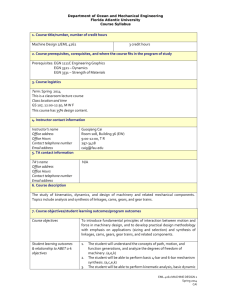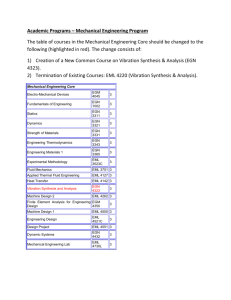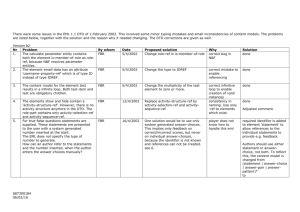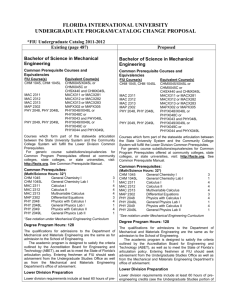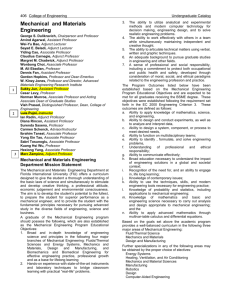Program Changes
advertisement
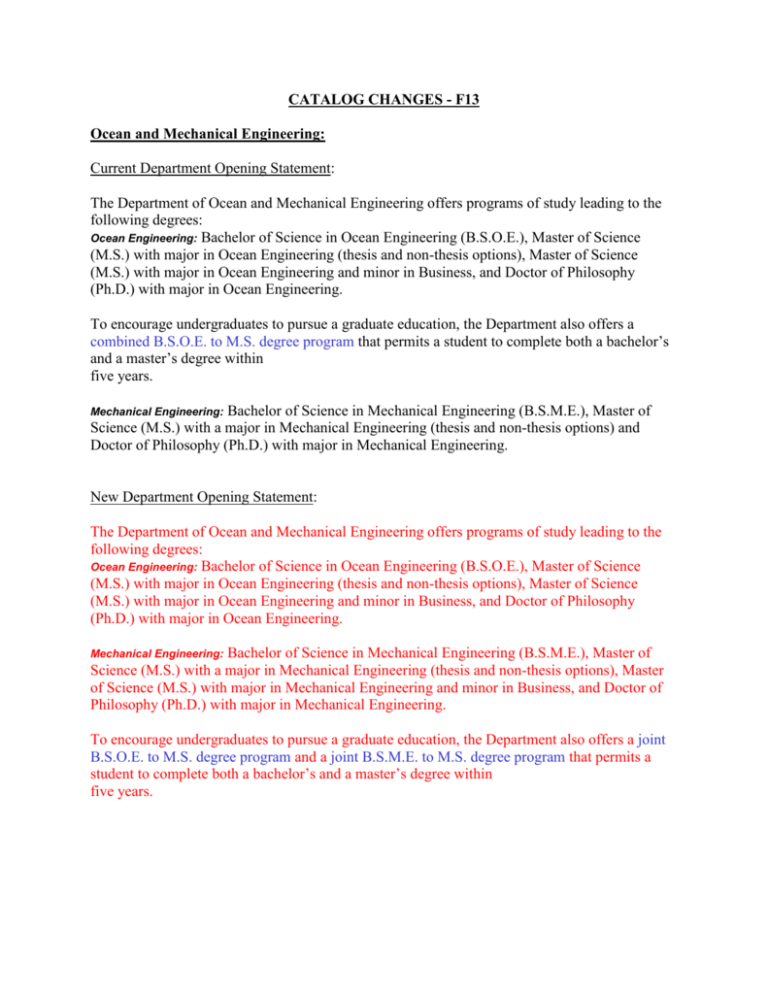
CATALOG CHANGES - F13 Ocean and Mechanical Engineering: Current Department Opening Statement: The Department of Ocean and Mechanical Engineering offers programs of study leading to the following degrees: Ocean Engineering: Bachelor of Science in Ocean Engineering (B.S.O.E.), Master of Science (M.S.) with major in Ocean Engineering (thesis and non-thesis options), Master of Science (M.S.) with major in Ocean Engineering and minor in Business, and Doctor of Philosophy (Ph.D.) with major in Ocean Engineering. To encourage undergraduates to pursue a graduate education, the Department also offers a combined B.S.O.E. to M.S. degree program that permits a student to complete both a bachelor’s and a master’s degree within five years. Bachelor of Science in Mechanical Engineering (B.S.M.E.), Master of Science (M.S.) with a major in Mechanical Engineering (thesis and non-thesis options) and Doctor of Philosophy (Ph.D.) with major in Mechanical Engineering. Mechanical Engineering: New Department Opening Statement: The Department of Ocean and Mechanical Engineering offers programs of study leading to the following degrees: Ocean Engineering: Bachelor of Science in Ocean Engineering (B.S.O.E.), Master of Science (M.S.) with major in Ocean Engineering (thesis and non-thesis options), Master of Science (M.S.) with major in Ocean Engineering and minor in Business, and Doctor of Philosophy (Ph.D.) with major in Ocean Engineering. Bachelor of Science in Mechanical Engineering (B.S.M.E.), Master of Science (M.S.) with a major in Mechanical Engineering (thesis and non-thesis options), Master of Science (M.S.) with major in Mechanical Engineering and minor in Business, and Doctor of Philosophy (Ph.D.) with major in Mechanical Engineering. Mechanical Engineering: To encourage undergraduates to pursue a graduate education, the Department also offers a joint B.S.O.E. to M.S. degree program and a joint B.S.M.E. to M.S. degree program that permits a student to complete both a bachelor’s and a master’s degree within five years. Changes under Bachelor of Science in Mechanical Engineering: Mathematics, Science and Computers Mathematics (through Calculus) 12 General Physics with Calculus (including Lab) 8 Chemistry (including Lab) 4 Differential Equations 3 Probability & Statistics for Engineers STA 4032 Computer Programming** 3 3 Computer Applications in Mechanical Engineering 2 EML 4534 3 Engineering Graphics EGS 1111C 3 ** Four-year students are to take Computer Applications in Mechanical Engineering, EML 2538, offered by the Department of Ocean and Mechanical Engineering. EML 2538 to be terminated effective spring 2014. ** Four-year students are to take Computer Applications in Engineering 1, EGS 2213, offered by the Department of Ocean and Mechanical Engineering. Mechanical Engineering Core Electro-Mechanical Devices EGM 4045 3 Fundamentals of Engineering EGN 1002 3 Statics EGN 3311 3 Dynamics EGN 3321 3 Strength of Materials EGN 3331 3 Engineering Thermodynamics EGN 3343 3 Engineering Materials 1 EGN 3365 3 Experimental Methodology EML 3523C 3 Fluid Mechanics EML 3701 3 Applied Thermal Fluid Engineering EML 4127 3 Heat Transfer EML 4142 3 Vibration Synthesis and Analysis EML 4220 3 Machine Design 2 EML 4262 3 Finite Element Analysis for Engineering Design EGM 4350 3 Dynamics Systems EGN 4432 3 Machine Design 1 EML 4500 3 Engineering Design EML 4521C 3 Design Project EML 4551 3 Mechanical Engineering Lab EML 4730L 3 Electives 8 credits (minimum) of departmentally approved technical electives. Students are required to have one design credit in the technical electives as identified in the approved list in the advising manual. Directed independent study (DIS) may be used as credit toward one technical elective in the student's program with approval of the faculty advisor and the Department Chair. Only in special cases of follow-up projects with the same faculty advisor, specifically approved by the Department Chair, will DIS be allowed as credit for a second technical elective. Co-operative education or Internships may be counted as credit toward technical electives up to a maximum of two credits. Only one credit may be earned per semester of Co-op or Internship and applied towards technical elective credit. Students are encouraged to take the Fundamentals of Engineering Examination for their professional development. It is recommended that it be taken in the first semester of the senior year. As an incentive to take the exam, students can earn the equivalent of 2 credits of technical elective toward their degree requirements. If they pass the exam, they will register for 2 credits of EML 4905, Directed Independent Study—Professional Registration, in the following semester and will be given pass/fail credit for the course. Sample Four-Year Program of Study for Bachelor of Science in Mechanical Engineering First Year, Fall (14 credits) College Writing 1* ENC 1101 3 Calculus for Engineers 1 MAC 2281 4 Engineering Chemistry General Chemistry 1 EGN 2095 CHM 2045 3 Engineering Chemistry Lab General Chemistry Lab 1 EGN 2095L CHM 2045L 1 Fundamentals of Engineering EGN 1002 3 College Writing 2* or equivalent ENC 1102 3 Calculus for Engineers 2 MAC 2282 4 Engineering Graphics EGS 1111C 3 Physics for Engineers 1 PHY 2043 3 General Physics 1 Lab PHY 2048L 1 Statics EGN 3311 3 Calculus with Analytic Geometry 3 MAC 2313 4 Introduction to Philosophy (GRW) or equiv.** PHI 2010 3 Physics for Engineers 2 PHY 2044 3 General Physics 2 Lab PHY 2049L 1 Strength of Materials EGN 3331 3 Engineering Thermodynamics EGN 3343 3 Computer Applications in Engineering 1 EGS 2213 3 First Year, Spring (14 credits) Second Year, Fall (14 credits) Second Year, Spring (15 credits) Engineering Mathematics 1 MAP 3305 3 Foundations of Society and Human Behavior course** 3 Third Year, Fall (15 credits) Electro-Mechanical Devices EGM 4045 3 Dynamics EGN 3321 3 Fluid Mechanics EML 3701 3 Computer Applications in Mechanical Engineering 2 EML 4534 3 History of Civilization 1 (GRW) or equiv.** WOH 2012 3 Dynamics Systems EGN 4432 3 Heat Transfer EML 4142 3 Finite Element Analysis for Engineering Design EGM 4350 3 Third Year, Spring (15 credits) Foundations of Creative Expression course** 3 Foundations of Society and Human Behavior course** 3 Third Year, Summer (12 credits) Probability and Statistics for Engineers STA 4032 3 Vibration Synthesis and Analysis EML 4220 3 Technical Elective 3 Foundations of Creative Expression course** 3 Fourth Year, Fall (15 credits) Engineering Materials 1 EGN 3365 3 Experimental Methodology EML 3523C 3 Applied Thermal Fluid Engineering EML 4127 3 Machine Design 1 EML 4500 3 Engineering Design EML 4521C 3 Machine Design 2 EML 4262 3 Design Project EML 4551 3 Mechanical Engineering Lab EML 4730L 3 Fourth Year, Spring (14 credits) Technical Electives 5 Total 128 * Course meets Writing Across Curriculum (Gordon Rule) requirements. ** Courses may be selected from the appropriate portion of the Intellectual Foundations Program. Move these two courses from "Electives" to "Core Courses": Vibration Synthesis and Analysis (EML 4220) 3 credits Prerequisites: EGN 3221 or equivalent and (MAP 2302 or MAP 3305) with minimum grades of "C" Free and forced vibration of mechanical systems; damping; periodic and transient excitations; vibration control; multiple degree of freedom and continuous systems. Finite Element Analysis for Engineering Design (EGM 4350) 3 credits Prerequisite: EGN 3331 or equivalent with minimum grade of "C" Fundamental concepts of finite element software to perform the stress, vibration, and heat transfer analyses of various engineering design problems. Changes to Course Descriptions: (must be submitted on course change forms; not to be considered as part of this proposal) Mechanical Engineering: Heat Transfer (EML 4142) 3 credits Prerequisite: EGS 2213 and EML 3701 with minimum grade of "C" Modes of heat transfer, one- and two-dimensional steady state heat conduction, unsteady heat conduction, numerical methods, computer program projects, empirical relations for forced and free convection, radiation properties, shape factors, radiation heat exchange between gray bodies. System Dynamics (EML 4380) 3 credits Prerequisites: EGN 3321 or equivalent, EGS 2213 and MAP 3305 with minimum grades of "C" Modeling and analysis of dynamics of physical systems including mechanical, electrical, fluid, thermal and mixed systems, with emphasis on linear, lump-parameter approach using analytical and computer-aided numerical techniques. Machine Design 1 (EML 4500) 3 credits Prerequisites: EGN 3331 or equivalent and EGS 2213 with minimum grade of "C" Introduction to machine design; fundamental principles in strength of materials; static and fatigue failure theories; design of machine elements; and design projects. Computer Applications in Mechanical Engineering 2 (EML 4534) 3 credits Prerequisites: EGN 3331 or equivalent, MAP 3305 and (EGS 2213 or COP 2220) all with minimum grades of "C" Review of MATLAB Language, numerical methods utilized in solving mechanical engineering problems, projects related to solid body mechanics, and thermal systems. Mechanical Engineering Lab (EML 4730L) 3 credits Prerequisites: EGN 3365 or equivalent and EML 3523C with minimum grades of "C" Pre or Corequisites: EML 4142 and EML 4380 or EGN 4432 with minimum grades of "C" Experimental work related to heat transfer, fluid mechanics, mechanical systems, materials and solid mechanics. Interdisciplinary: Dynamic Systems (EGN 4432) 3 credits Prerequisites: EGN 3321 or equivalent and MAP 3305 and (EEL 2161 or EGS 2213 or equivalent) Acquaints students with basic knowledge about dynamic systems, systems stability analysis and basic controller design.
